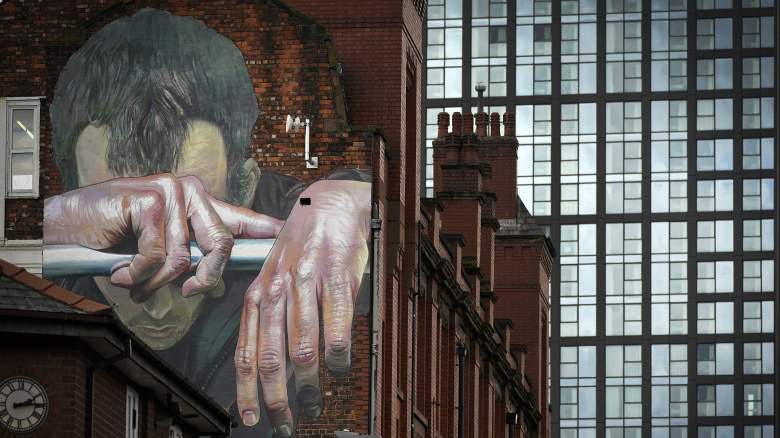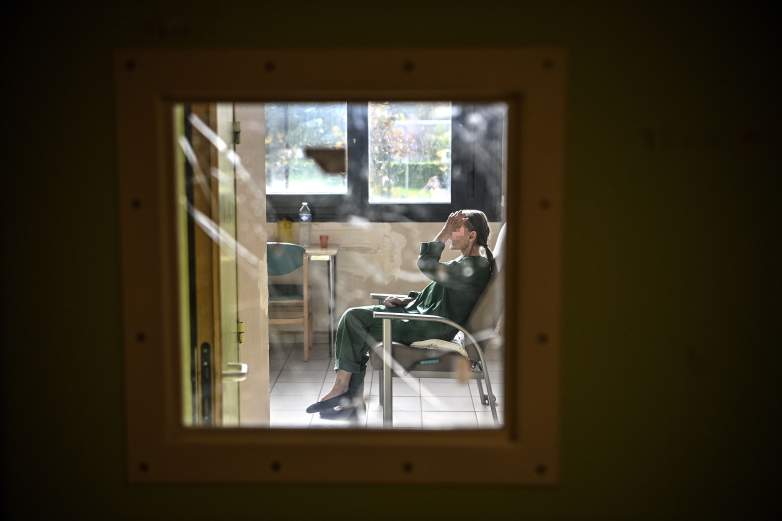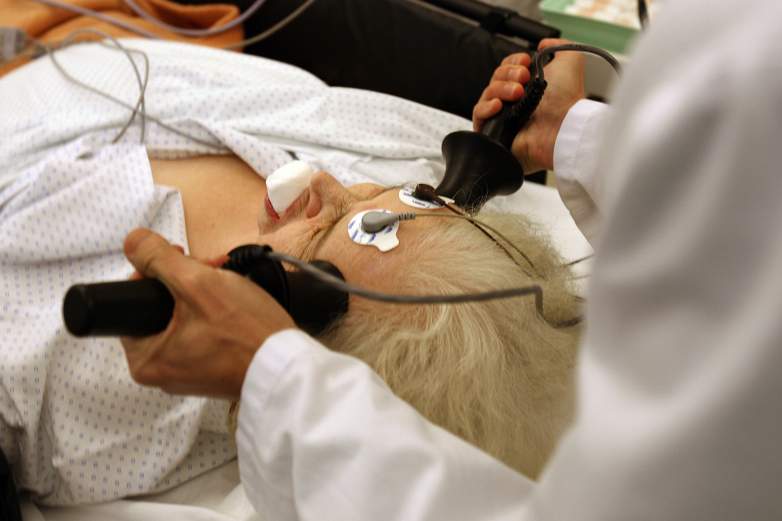
Getty A mural by german artist Case depicts mental health issues on a wall in the city center on October 15, 2020 in Manchester, England.
The virus that brought the world to its knees this past year continues to unfurl a baffling array of possible outcomes. It’s already known that you can have COVID-19 and not even know it because you have no symptoms, or you can die from the disease in a matter of days or weeks. You can have mild symptoms or severe symptoms ranging from cough and fever to loss of smell and taste to blood clots to diarrhea. You can be a “long-hauler,” someone who is still unwell months after the virus has cleared your system.
And now doctors are saying that they’ve seen a small but notable number of people who have no history of mental illness recovering from COVID-19 only to develop severe psychosis in the weeks or months to follow, according to multiple studies and the New York Times.
Case reports are growing of those who have recovered from COVID-19 subsequently being admitted to hospitals after complaining of hearing voices, hallucinating, and having urges to kill themselves or others. While it is something doctors are just starting to see in the aftermath of some COVID-19 infections, psychosis brought on by infections is not new to epidemiologists.
According to a paper published in Neuroscience Letters:
Literature suggesting an association between infection and psychosis can be traced many centuries, but even as far back as discussions of the ‘psychoses of influenza’ in the 17th and 18th century it was recognized that specific, predominantly respiratory infections, are temporally associated with acute psychosis. Most notably, hundreds of cases of acute post-influenzal psychosis were reported during and after the 1918−19 Spanish influenza pandemic.
The good news is that it’s possible the psychosis is temporary, but like all things COVID-19, much is still unknown for sure.
A Mother Heard Voices Urging to Kill her Children, Another Woman Associated the Color Red With People Wanting to Kill Her, & A Man Woke Up Saying, “Today I Should Die!” Then tried ‘To Cut His Neck With a Knife.’

GettyA patient with mental disorders sits on a chair in her room at The Ville-Evrard Psychiatric Hospital in Saint-Denis, north of Paris on November 3, 2020. – After the consequences of the first confinement linked to Covid-19 are just starting to fall as psychiatrists at the mental health establishment of Ville-Evrard, in the Paris suburbs, fear a second “psychiatric wave”.
Two things the small group of patients diagnosed exhibiting psychotic symptoms have in common is that they all had COVID-19 but had not previously suffered from psychotic disorders.
The New York Times wrote of a 42-year-old physical therapist who had no history of mental illness suddenly seized by fantasies of killing her four children and had even made plans as to how to do it. The voice that was telling her to do those things also told her to kill herself, according to the paper.
A 52-year-old man who survived COVID-19 only to develop paranoia so bad it made him try to take his own life is described in another case study. He had no history of mental illness, but had delusions of being the cause of COVID-19 and descended into mutism — or not speaking. He sought treatment, which helped temporarily, but the paranoia came back and culminated in him waking up and declaring ‘Today I should die! and attempted to cut his neck with a knife,” according to the case study.
After he was admitted to the hospital for further treatment he “attempted to cut his wrist with a plastic knife from his breakfast tray,” the case study reported.
A 55-year-old woman’s psychosis developed after her bout with COVID-19 in which she is described as having hallucinations and “paranoid delusions involving color symbolism whereby she attributed the color red to people who were trying to kill her,” that case study described.
She was admitted to a psychiatric hospital where she is described as doing odd things like washing her phone in a sink “and repetitively brushing her teeth with soapy water,” according to the case study. The woman also reportedly believed that a relative she had a video call with was not really her relative but had been replaced or taken over by another entity.
That patient had no history of mental illness either, according to doctors.
The New York Times wrote, “Indeed, doctors are reporting similar cases across the country and around the world. A small number of Covid patients who had never experienced mental health problems are developing severe psychotic symptoms weeks after contracting the coronavirus.”
Doctors Are Throwing Everything They Can at the Strange Phenomenon — Including Electroconvulsive Therapy — to Try to Bring Affected Patients Back to Normal

GettyPicture taken February, February 5, 2007 in Sainte-Anne psychiatric hospital in Paris shows doctors practicing electric shock therapy on a patient.
Doctors describe trying various pharmaceutical treatments, in-depth screenings, and hospitalizations of patients who seem to have developed psychosis after recovering from COVID-19, but no two cases are the same and each has required a sort of trial-and-error approach.
In the case of the 52-year-old suicidal man, he ultimately underwent six sessions of electroconvulsive therapy before his suicidal impulses subsided, his case report said.
The New York Times reported the mother who developed homicidal thoughts and plans about killing her children spent four weeks in a hospital before going home. She was treated with risperidone, a drug used to treat schizophrenia and bipolar disorders.
Dr. Hisam Goueli told the paper, “We don’t know what the natural course of this is. Does this eventually go away? Do people get better? How long does that normally take? And are you then more prone to have other psychiatric issues as a result? There are just so many unanswered questions.”
The 55-year-old woman who suffered paranoid delusions had a slow meandering sort of recovery. Her case study reports that she was discharged from the hospital at her own request after 20 days, but she still had paranoid thoughts. She was also prescribed risperidone, but stopped taking it about a week later and reported having the feeling that someone was going to kidnap her, but otherwise seemed to be doing better.
It wasn’t until 52 days after her initial admission to the hospital that she said she no longer had psychotic symptoms, according to the case study.
As doctors continue to learn more about COVID-19’s effect on the various systems of the body, the writers of the Neuroscience Letters think it may be this particular affliction may give insight to understanding factors in the brain that leads to psychosis.
They wrote, “Against the background of the tragedy of the COVID-19 pandemic, there may yet emerge the opportunity for greater understanding of a disabling mental illness.”
READ NEXT: Investigation Finds Rampant Sexual Assault of Inmates By Prison Staff